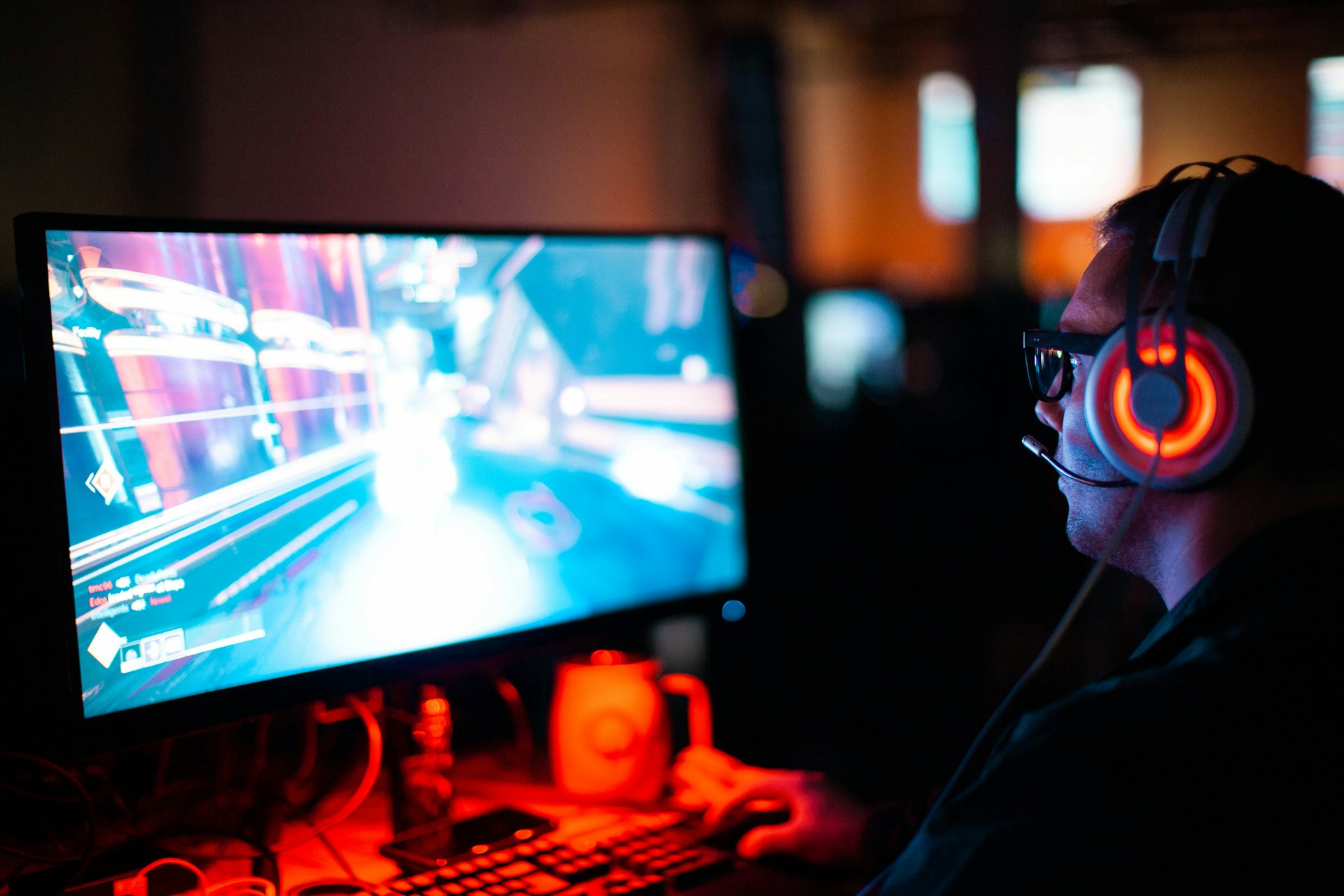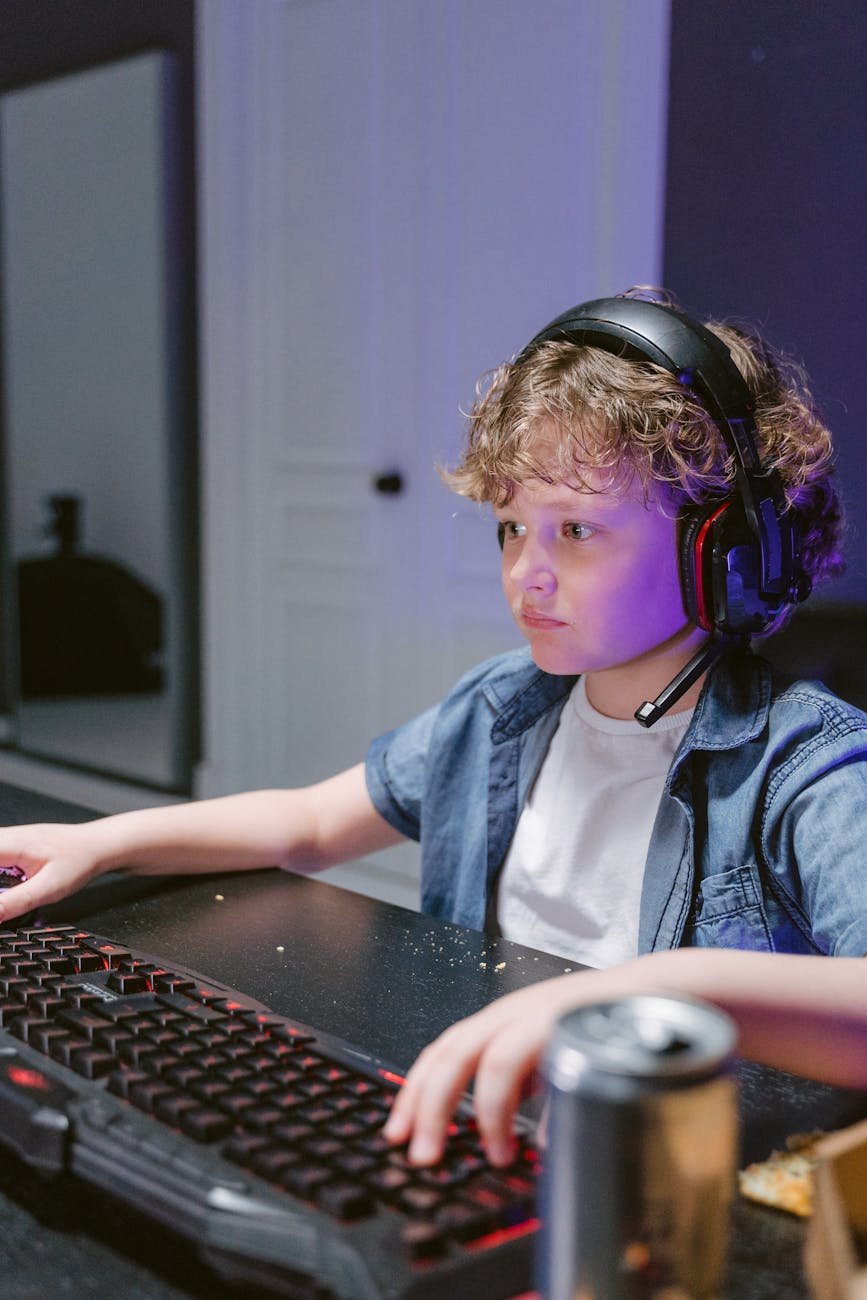The Connection Between Blue Light Blocking and Better Sleep
Gaming late into the night or scrolling through your favorite streams—sound familiar? While these moments are fun, the screens you love can silently sabotage your sleep. The culprit? Blue light. It’s the high-energy light emitted by digital devices that tricks your brain into thinking it’s still daytime. But don’t worry—blue light blocking glasses could be your ticket to uninterrupted, restful nights.
How Blue Light Tricks Your Brain into Staying Awake
Blue light doesn’t just affect your eyes; it messes with your internal clock. Your body has a natural rhythm, called the circadian cycle, that tells you when it’s time to wake up or wind down. When you’re staring at screens before bed, blue light blocks melatonin—the hormone that signals your body it’s time to sleep. Instead of feeling sleepy, you’re left tossing and turning long after you log off.
Blue light blocking glasses filter out this disruptive light. Think of them as tiny shields for your eyes, working silently to keep your melatonin levels balanced. By wearing them during evening gaming sessions, you’re essentially telling your body, “Hey, it’s nighttime—time to relax!” And who doesn’t want to drift off to sleep quicker after an intense gaming session?
Why Sleep Matters for Gamers
Good sleep isn’t just about waking up refreshed—it’s essential for gaming performance, too. Studies show that poor sleep affects reaction times, decision-making, and even your ability to focus. You know that frustrating moment when you miss an enemy because your reflexes were off? Lack of sleep could be the culprit.
When you wear blue light blocking glasses, you’re giving your body a chance to recover fully. Sleep is when your brain processes what you’ve learned, whether it’s new game strategies or muscle memory for those tricky combos. Without it, your gaming grind can take a hit—and no one wants that.
Imagine this: You wrap up your night of gaming, slip off your glasses, and head to bed. Instead of feeling wired, you’re relaxed, and sleep comes easier. That’s the power of blue light blocking glasses—they help bridge the gap between screen time and dream time.
What’s even better is how quickly you’ll notice the difference. After just a few nights, you might wake up feeling more refreshed, with fewer groggy mornings. Your energy levels will stay steady throughout the day, making it easier to balance gaming, school, work, or whatever’s on your plate.

Tips to Maximize the Benefits
If you want to get the most out of your blue light blocking glasses, pair them with some simple habits. Try switching to a “dark mode” or “night light” setting on your devices, especially a couple of hours before bed. You can also dim the lights in your gaming room to create a relaxing vibe—it’s like setting the stage for a great night’s sleep.
And don’t forget about timing. While these glasses work wonders during late-night gaming, wearing them throughout the evening can boost their effectiveness. By the time you power down, your body is already in wind-down mode, making the transition to sleep that much smoother.
Night Mode: Is It Enough?
If you’re someone who games late into the night or works on your PC until bedtime, you’ve probably heard of Night Mode. Most devices have it, promising to shield your eyes by toning down blue light. But does it really do the job, or is it just a digital placebo? Let’s break it down.
What Does Night Mode Actually Do?
Night Mode, or “Blue Light Filter” on some devices, shifts your screen colors from bright blues to warmer, orange-toned hues. It’s a bit like swapping a harsh spotlight for a soft candle glow. The idea is that this softer light is less stimulating for your brain and easier on your eyes during the evening.
It sounds great in theory, and yes, Night Mode does reduce some blue light. But here’s the catch: it doesn’t block all of it. Blue light wavelengths still sneak through, and over time, even a reduced amount can disrupt your sleep cycle. So while Night Mode is a step in the right direction, it’s not a foolproof solution.
Why Night Mode Alone Falls Short
Imagine trying to play a game with only half your gear—frustrating, right? That’s what relying solely on Night Mode feels like for your eyes. While it lessens the intensity of blue light, it doesn’t address glare or prolonged exposure, two key factors that lead to eye strain.
Another limitation of Night Mode is its focus. It only affects your device’s screen, leaving out any additional monitors or sources of light in your setup. If you’re gaming with RGB lights or working in a brightly lit room, Night Mode can’t protect your eyes from those distractions.
Let’s also talk about color accuracy. For gamers, especially those who need sharp visuals for strategy or competitive play, Night Mode’s warmer tones can distort graphics. Nobody wants to confuse a loot box for a random piece of debris because of a color shift!
How Blue Light Blocking Glasses Close the Gap
This is where blue light blocking glasses swoop in to save the day—or rather, the night. These glasses are designed to tackle blue light head-on, filtering out harmful wavelengths while preserving your screen’s clarity and colors. They don’t just protect your eyes—they upgrade your entire gaming experience.
The biggest advantage? Blue light blocking glasses protect you regardless of the light source. Whether it’s your screen, ambient lighting, or that glowing RGB tower next to your desk, your eyes stay shielded. Plus, they’re stylish enough to fit right into your gaming setup without missing a beat.
Wearing these glasses alongside Night Mode creates a powerhouse combo for protecting your eyes. It’s like having a tank and healer in your gaming squad—they work better together!
Finding the Balance: Night Mode + Glasses
So, is Night Mode useless? Definitely not. It’s still a handy tool, especially when paired with blue light blocking glasses. Think of it as the warm-up act before the main show. Turn on Night Mode to ease some strain, and then let your glasses handle the heavy lifting.
If you’re serious about reducing eye strain and protecting your sleep, consider using both. Night Mode helps with quick fixes, but glasses provide consistent, full-spectrum coverage. This combination ensures your late-night gaming sessions don’t come at the cost of your health.
Maximizing Your Setup for Comfort
Want to take it a step further? Adjust your room’s lighting. Switch to softer, warmer bulbs during nighttime and dim the brightness of your monitors. Position your screens to reduce glare and give your eyes a break every 20 minutes by looking at something 20 feet away for 20 seconds.
And, of course, keep your blue light blocking glasses within arm’s reach. They’re the ultimate low-maintenance accessory for gamers. Slip them on, and you’re good to go—no settings or updates required.
How Blue Light Filtering Helps Gamers Recharge
When it comes to gaming, endurance matters just as much as skill. Whether you’re grinding through ranked matches or exploring massive open worlds, staying sharp is essential. But long hours in front of a screen can leave your eyes feeling like they’ve just faced the final boss. That’s where blue light filtering steps in to help gamers recharge, both physically and mentally.
Protecting Your Eyes for Longer Gaming Sessions
Every gamer knows the struggle of eye strain. That itchy, tired sensation creeps in after hours of staring at a brightly lit screen. It’s not just uncomfortable—it can also mess with your focus and reaction time, putting your performance at risk. Blue light filtering glasses act as a shield, reducing the harshness of screen light and keeping your eyes comfortable.
Imagine playing through an intense raid without needing to rub your eyes every five minutes. With blue light filtering, your vision stays clear, and you can focus on what really matters—crushing your opponents or achieving that 100% completion. It’s like giving your eyes a buff for endurance and clarity.
Recharging Your Brain for Peak Performance
Here’s the thing about blue light: it doesn’t just strain your eyes; it also tricks your brain into thinking it’s daytime. That’s why you might feel wired after a late-night gaming session, struggling to fall asleep even when you’re exhausted.
Blue light filtering helps reset your brain’s natural rhythm, making it easier to wind down after gaming. By reducing the artificial light signals that keep your brain on high alert, these glasses let you transition more smoothly into relaxation mode. A well-rested brain means sharper reflexes and better decision-making when you log back on.
Think of it this way: your brain is like a CPU. Overclocking it without proper cooling leads to lag and inefficiency. Blue light filtering glasses are like a cooling system, ensuring your brain runs smoothly without overheating.
Better Sleep for Epic Comebacks
We’ve all been there—one more match turns into three more hours, and before you know it, the sun’s up. While gaming late into the night is fun, sacrificing sleep isn’t. Poor sleep leads to sluggish reactions and a foggy mind, which no gamer wants during a competitive match.
Blue light filtering helps you sleep better by blocking the wavelengths that suppress melatonin, your body’s sleep hormone. When you finally shut down your rig, your body is ready to rest instead of stuck in “awake” mode. The result? You wake up feeling recharged and ready to tackle your gaming goals, whether it’s climbing the ranks or perfecting your aim.
A Game-Changer for Competitive Players
For competitive gamers, every edge counts. Reaction times, decision-making, and focus are the pillars of high-level play, and blue light filtering directly supports all three. By reducing eye strain and promoting better sleep, these glasses ensure you’re always at your best.
They’re especially helpful during marathon gaming sessions, like tournaments or all-night LAN parties. With less strain on your eyes, you can stay locked in longer without sacrificing accuracy or awareness. Plus, you’ll be the only one not complaining about tired eyes the next day!
Recharge While Staying Stylish
Let’s not forget the style factor. Blue light filtering glasses aren’t just practical; they look great, too. Modern designs cater to gamers who care about aesthetics, blending seamlessly into your setup or stream. You can protect your eyes while looking like a pro, which is a win-win.
Imagine pulling off a clutch play on stream while rocking sleek glasses that complement your RGB-lit room. It’s the kind of energy that screams “next-level gamer.”
Creating a Sleep-Friendly Routine After Gaming
Late-night gaming sessions are fun, but let’s face it—crashing into bed right after doesn’t always lead to quality sleep. Your brain is still in overdrive, replaying epic wins and near misses. Building a sleep-friendly routine after gaming can make all the difference in how refreshed you feel the next day.
Step 1: Power Down Your Screens
The first step to better sleep after gaming is simple: step away from the screen. Blue light from your monitor, console, or even your phone tricks your brain into thinking it’s still daytime, making it harder to unwind.
Instead of hopping straight from the battlefield to bed, set a timer to remind yourself to power down at least 30 minutes before you plan to sleep. Use this time to transition out of “gamer mode.” Trust me, your future self will thank you when waking up feels less like respawning after a defeat.
If you absolutely can’t tear yourself away, consider using blue light blocking glasses during gaming. These can reduce the impact of blue light on your brain, making it easier to relax when it’s time to log off.
Step 2: Create a Chill Zone
Turning your bedroom into a sleep sanctuary can work wonders for your rest. After a high-stakes match, your adrenaline might still be pumping, and your mind might be racing. A calming environment can help signal your body that it’s time to chill.
Start by dimming the lights and keeping your space cool. If you’ve got RGB lighting in your room, switch to softer, sleep-friendly colors like warm reds or purples. Add calming sounds, like a white noise machine or a playlist of relaxing tunes, to help drown out distractions.
You can also introduce a few habits to wind down physically. Stretching for a few minutes or practicing deep breathing can help you feel grounded. It’s like hitting the “pause” button on your body and brain after an intense gaming session.
Step 3: Develop a Pre-Sleep Ritual
Gamers thrive on routines—whether it’s warming up before a ranked match or following a strategy to beat a boss. Why not apply the same mindset to bedtime?
Start small with a consistent pre-sleep ritual. Maybe it’s reading a chapter of a book, journaling about the day, or sipping on a cup of herbal tea. Keep your routine screen-free to give your eyes a break. Bonus points if your ritual is something you look forward to—it makes sticking to it much easier.
And don’t forget your body’s natural cues. Try to sleep and wake up at the same time every day. Even if you’re tempted to stay up all night grinding, consistency will help your body clock adjust, making it easier to fall asleep and wake up naturally.
Step 4: Avoid the Common Sleep Traps
Certain habits might feel like they’re helping, but they could actually be sabotaging your sleep. For example, having a midnight snack might satisfy your cravings, but heavy or sugary foods can disrupt your rest. Stick to light, healthy options if you need a bite before bed.
Another trap? Drinking energy drinks or coffee late into the night. These are great for fueling long gaming sessions but terrible for settling down afterward. If you want to stay alert during gaming, try switching to water or decaf options as your session winds down.
Lastly, scrolling through your phone in bed can also backfire. The blue light from your device is just as disruptive as your gaming setup. Try putting your phone on “Do Not Disturb” mode and placing it across the room before you sleep.
Step 5: Reflect and Relax
After gaming, your mind is probably buzzing with thoughts—what went right, what went wrong, and what you’ll try next time. Use this energy in a positive way by reflecting on your gaming achievements while practicing relaxation techniques.
For instance, you could think about your best plays of the night while lying in bed with your eyes closed. Pair this with deep breathing, focusing on slow, even inhales and exhales. It’s a simple way to combine mental and physical relaxation, setting you up for a restful sleep.
Sleep is the Ultimate Buff
Getting a good night’s sleep is like equipping the ultimate buff for your next gaming session. You’ll feel sharper, react faster, and stay focused for longer. By creating a sleep-friendly routine after gaming, you’re not just improving your rest—you’re leveling up your overall health and performance.
So, give yourself a chance to recharge fully. Your games—and your well-being—deserve the best version of you. Now, power down, relax, and let sleep work its magic. Tomorrow’s victories are waiting!


